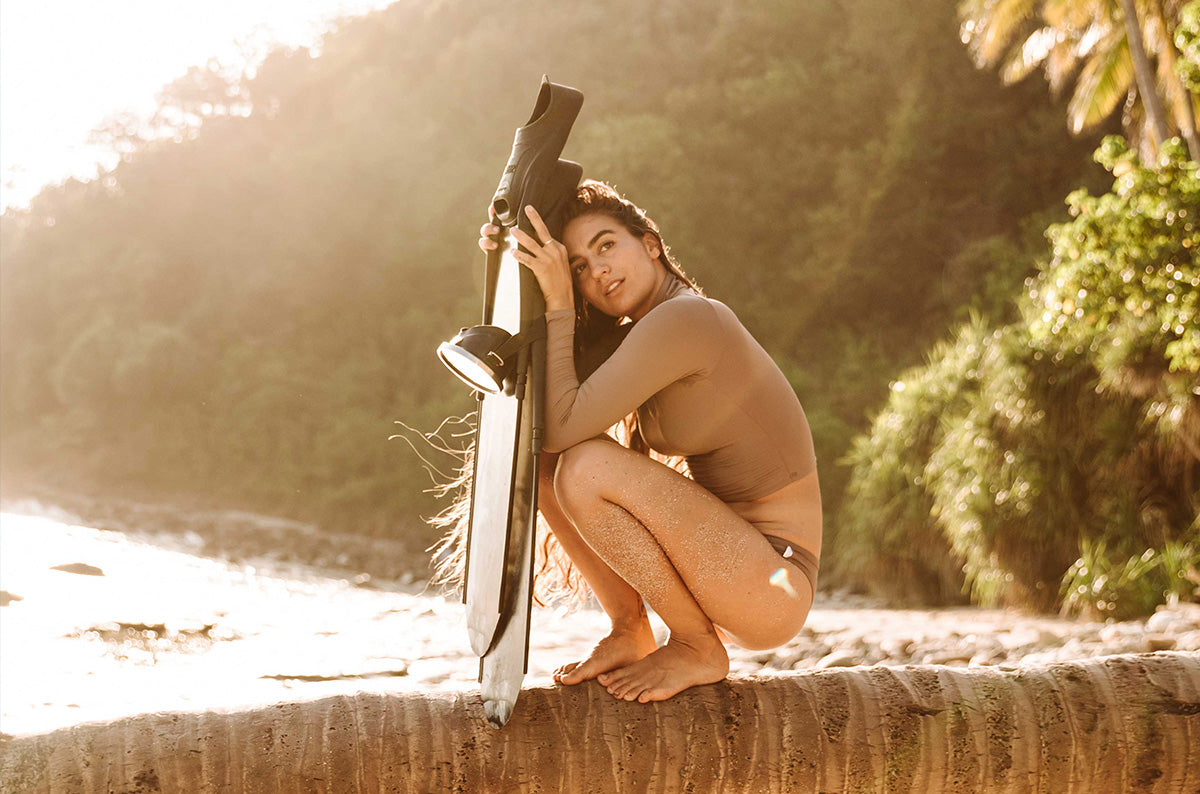As environmentally conscious women in love with the sea, we at Dkoko are so inspired by brave waterwomen living their passion for ocean conservation. We caught up with Madison Stewart, Founder of Project Hiu, to learn more about her courageous work saving sharks from overfishing in Indonesia, where her innovative approach encourages alternative livelihood possibilities among shark fishermen. Read on to learn more about Madison and her tireless work saving sharks from the unconscionable greed of consumer markets.
We ocean-lovers at Dkoko are so inspired by your work and commitment to saving the sharks. Can you tell us how you got started and how your work with Project Hui has evolved?
I started when I was 14 because I already loved sharks, but I was starting to see them disappear from places I grew up diving. I have had a life full of conservation and about three years ago it turned into my favourite project yet- Project Hiu. I found myself in Indonesia with a film crew to document the famous shark market here where sharks are killed for their fins... I then discovered this amazing country, and came back a few years later with the idea of starting Project Hiu.

What are the biggest challenges you face in your work and how have you sought to overcome them?
Funding, burn out and lack of guidance. This isn't a job, I don't make money from it, I actually worked at the airport in security for a year and a half to fund half my projects. Now I have amazing support from the public and good film work here and there that keeps me afloat. Burn out is real- sometimes you go and go with the weight of the world on your shoulders and you don't take care of yourself and a few times that has made life difficult for me. I have gotten better at maintaining my own health now, mental and physical. Finally- there is no school class for what I do, no one to guide me, no path in our society for people who want to do conservation, so making my own path is a massive challenge.
Why are sharks so important for our global ocean ecosystems?
Sharks are keystone species, some are apex predators, they are truly the underdog and contribute to the health of entire marine ecosystems. They are an important species to have in healthy numbers in the ocean. They have also been a part of our oceans for 400 million years.

Why have you dedicated your life to doing this work despite the personal risks you encounter?
I think it was always in me... having said that I actually never planned on being a conservationist. Its not what I wanted to do but I think it became necessary when I saw a change in our oceans in such a short amount of time. The oceans gave me life, they were my childhood, they are my connection to my family, I grew up on a sail boat with my parents and then diving with my father, therefore I feel I owe them my life.
If the whole world knows that killing sharks is an ecological catastrophe, why on earth is this still happening?
There are few things in the world that will surpass the desire for money and therefore the exploitation of anything to get it. The demand of shark fin in China remains strong, as long as that is there, the pressure to fish sharks will control the way many developing nations interact with and fish the oceans.

What else do we need to know about ocean conservation and shark species protection?
I think the best thing for people to know and realize is that they are capable of having an impact no matter where they are or what they are doing. Shark meat and products that contain sharks are in our everyday life and a major first step to take is to avoid using them. You can learn more about that here.
What can we as ocean-loving women do to support your work with Project Hui and help save the sharks?
Support my work through www.projecthiu.com and keep spreading the word for sharks!

Underwater photos by Juan Medina
Lifestyle photos by https://www.instagram.com/caraghcreative/
Interview by Tara Ruttenberg


